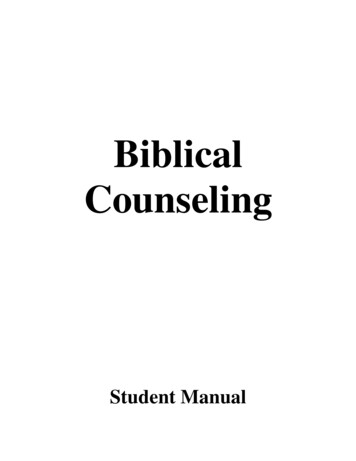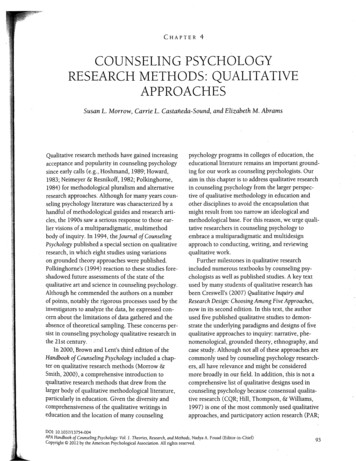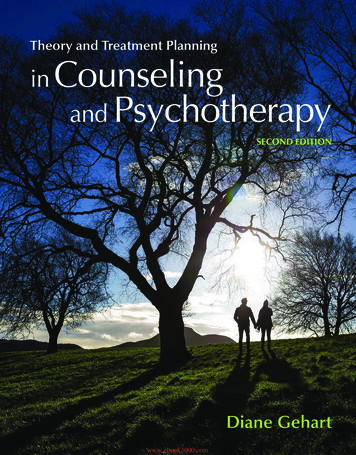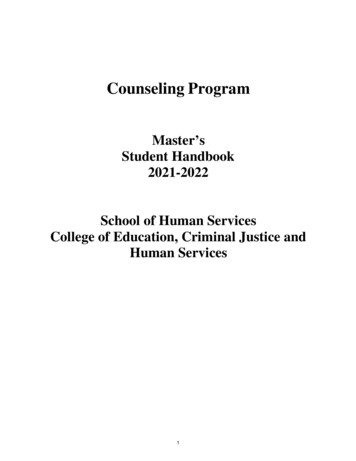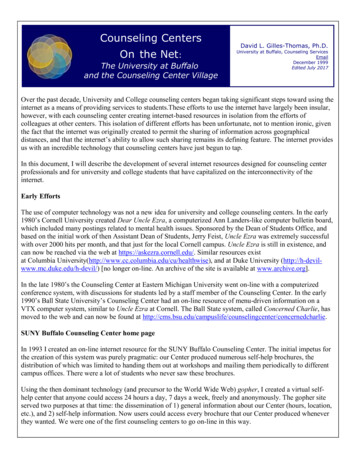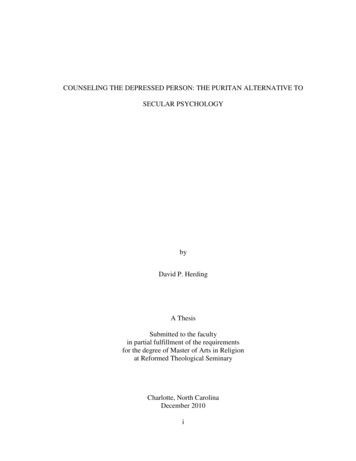
Transcription
COUNSELING THE DEPRESSED PERSON: THE PURITAN ALTERNATIVE TOSECULAR PSYCHOLOGYbyDavid P. HerdingA ThesisSubmitted to the facultyin partial fulfillment of the requirementsfor the degree of Master of Arts in Religionat Reformed Theological SeminaryCharlotte, North CarolinaDecember 2010i
Accepted:Andrew J. Peterson, Ph.D.Dissertation AdvisorSecond ReaderThird Readerii
ABSTRACTCounseling Chronically Depressed People: The Puritan Alternative to Secular PsychologyDavid P. HerdingWhile there is an abundance of existing literature written on the subject ofcounseling depressed people from both secular psychological and religious perspectives, theviews and methods of the Puritans on the subject are largely unknown, untapped andunapplied among contemporary Christians. Even though depressed moods and traits havebeen in existence since the fall of mankind, many secular psychologists and Christiancounselors still do not rightly understand its origins, causes and cures and are too quick tomedicate the problem or resort to self-help methods. But the ancient Biblical principlesdocumented and applied by the Puritans for the diagnosis and cure of depression have provento be what sufferers really need and desire. Therefore, the general intent is to put the topic ofcounseling of the depressed to the test by examining the historical writings and counsel ofPuritan writers against that of their current counterparts, namely the secular psychologicalmethods, and how these modern methods fall short in dealing with a syndrome of depression.In particular, the Puritan foundational theories of diagnosing a pattern of depression and thetheological themes they used for cures of such situations are examined and thoroughlydocumented. Finally, these methods of the Puritans are considered for the current culture andhow the diagnosis, causes, cures and prognosis can all be rightly and widely applied to thosewho are chronically depressed in the contemporary church.iii
CONTENTSChapterPage1. INTRODUCTION .1Secular Psychology and Puritan Terminology Pertaining to Depression .6Historical Background .8Secular Psychology History – Who Were the Psychologists?.8Puritan History – Who Were the Puritans?.162. DIAGNOSIS .28Secular Psychology Diagnosis .29Puritan Diagnosis and Biblical Examples .303. CAUSES AND CURES.43Secular Psychology Causes, Cures and Guiding Principles .43Authority of Man .44No Need for God .45Man is Good and Innocent.46Puritan Causes, Cures and Guiding Principles.47Authority of God.48High View of God .50Man is Sinful and Guilty.524. PROGNOSIS .56Secular Psychology Prognosis .56Depression as an Disease to be Eradicated.57iv
Man’s Sovereignty in Medicating Depression .58Resting on Man’s Guesses.59Puritan Prognosis .62Depression as a Friend to be Embraced.62God’s Sovereignty in Allowing Depression .63Resting on God’s Promises.665. CONCLUSION.706. AFTERWARDS .76Appendix1. KEY DATES IN PURITAN HISTORY.802. KEY DATES IN SECULAR PSYCHOLOGY HISTORY.823. DEPRESSION COUNSELING OUTLINE .834. SPIRALS AND RESPONSES.84BIBLIOGRAPHY.85v
CHAPTER 1INTRODUCTION“I am sorry to have to tell you this, but the results of the tests indicate that youhave signs of mild to moderate depression. And I am going to recommend that a pastoralleadership position is not the best career choice for you upon graduation.”What? How could that be? He had just spent the last couple of years in seminarypreparing for pastoral ministry. He had put his family life and promising career on hold topursue a dream of serving God and helping others as a full-time vocation. Throughout theyears of faithful church attendance, numerous laypeople along with well-respected leaders inhis church often told him that he has strong ministry gifts in the areas of teaching andleadership, and that he should attend seminary in order to fine-tune those spiritual gifts.Were they wrong? Was the school approved Christian psychologist that delivered thestinging news about his depression somehow mistaken? After all, how could a small batteryof tests like personality profiles, psychological analysis, physical assessments and one-onone interviews truly reveal something as subjective as depression? He did not know that theresults and recommendations of these required, school-sanctioned tests were conditional tograduating and obtaining a seminary degree.Prior to the results of these tests, he never considered himself as a depressedindividual. Sure, he was easy-going, quiet, reserved, stoic, guarded, somewhat introvertedand rarely wore his emotions on his sleeve. But at the same time he was stable, empathetic,logical, practical, fair, passionate and theologically inquisitive. He could not get enough of1
the Bible whether it was through reading or listening to sermons and lectures. Peoplecomplimented him on his ability to digest and remember doctrines, history, dates, names andaccomplishments of other past and present heroes of the faith. He was commended in hischurch community for being able to explain and teach complex theological concepts bybreaking them down, looking at the parts and then putting them all back together again todemonstrate how the parts fit with the whole of the Bible. Confirmation in his teaching skillscame often from others due to his ability to speak to the multiple levels of people in order tomeet them where they were at in their spiritual walks. Teaching did not even feel like workto him. He felt God’s pleasure when he taught others through the ministry of preaching andteaching. Things were going so well in these areas that it became quite obvious thatseminary was the next logical step to an eventual career in professional pastoral ministry.But all of those past accomplishments and commendations meant nothing now thathe was diagnosed with the label of “depression.” His ministry goals and dreams werecrushed at the moment the Christian psychologist delivered the bad news. The professionalsmade their recommendation and the institution concurred: They would not be sending him toany church or ministry internship due to his current state of being. The seminary offered nofurther help and gave no hope of future recovery. He chose not to argue with theprofessional results. He immediately dropped out of the MDiv program just a few credits shyof his supposed, divinely-ordained calling believing that God and the church could not usesuch a damaged person. His spirit needed healing, and his soul needed immediate care. Hewas without hope. Then the Puritans spoke ***2
“Bless the LORD, O my soul, and all that is within me, bless his holy name! Bless theLORD, O my soul, and forget not all his benefits.”Ps 103:1-2The soul of man bears the image of God; so nothing can satisfy it but He whose image itbears. Our soul, says Augustine, was created as by God, so for God, and is thereforenever quiet till it rests in God.1True psychology (“the study of the soul”) can be done only by Christians, since onlyChristians have the resources for the understanding and the transformation of the soul.Since the secular discipline of psychology is based on godless assumptions andevolutionary foundations, it is capable of dealing with people only superficially andonly on the temporal level. The Puritans, long before the arrival of godless psychology,identified their ministry with people as “soul work.”2Psychology derives its name from “the study of the soul.”3 From a biblical view,the emotional, inner, nonmaterial, part of all mankind that survives after bodily death, thehuman soul (nephesh in Hebrew; psuché in Greek) has been in existence since God firstbreathed life into man. Even though this noncorporeal soul cannot be seen or physicallyquantified, the Puritans believed in the preciousness, greatness and direct correlation of thesoul as it related to mankind is that it is “the best, and most noble part of man, as distinctfrom the body [but] the body is but a poor, empty vessel, without this great thing called thesoul”4 and “if the soul be lost, the man is lost.”5 Due to this inseparable man/soulconnection, Puritan reasoning concluded that man can be temporally damaged and eternally1Thomas Gataker, quoted in A Puritan Golden Treasury, ed. Thomas, I.D.E (Carlisle, PA:The Banner of Truth Trust, 2000), 286.2John F. MacArthur, Our Sufficiency in Christ (Dallas, TX: Word Publishing, 1997), 58.3Ed Bulkley, Why Christians Can't Trust Psychology (Eugene, OR: Harvest House,1993), 335.4Bunyan, John, The Greatness of the Soul (Bellingham, WA: Logos Research Systems,Inc, 2006), 108.5John Flavel, Pneumatologia: A Treatise of the Soul of Man (Carlisle, PA: The Banner of3
lost as a direct result of his soul being sinfully affected and manifesting into a melancholicdepression.Because of its wide-spread frequency amongst many people groups throughouthistory, depression is known as the “common cold of mental illnesses,”6 and has universallyplagued the human souls of many in a fallen, sinful world. Though it takes many forms,manifests itself differently and is called by various names, it is a little known fact thatdepressed moods plagues multitudes of Christians. While that might sound like a shockingstatement since the stereotypical Christ follower is often incorrectly portrayed as a happy-golucky, smiling person without a care in the world, some immediate questions come to mind:Can true Christians become depressed? Might it be possible that overt, rebellious sin leads todepression? Could all of these hurt and deeply discouraged believers be helped andencouraged by relying upon the Scriptures alone for answers in dealing with those who aredepressed? Are seventeenth-century Puritanical techniques old and outdated for dealing withthe depressed? Or have modern-day, secular psychological discoveries proven to be a better,more effective means to deal with the contemporary epidemic of depression? And mostimportantly, what does our ultimate standard, the Bible, direct us to think about this matter ofdepression?These questions will be addressed throughout this paper as it leads to thisconclusion: As the “true physicians of the soul,”7 the Puritans and their gospel-driven, timetested, Christ-centered, Scriptural counseling methods and hope-filled practices produce theTruth Trust, 1968), Volume 2: 477.6David G. Benner and Peter C. Hill, eds., Baker Encyclopedia of Psychology &Counseling, 2nd ed. (Grand Rapids, MI: Baker Books, 1999), 335.7Timothy J. Keller, "Puritan Resources for Biblical Counseling," The Journal of Pastoral4
best, longest-lasting, God-glorifying results regarding depression in the life of a Christian.An introductory note: Due to page limitations, this thesis project will be purposefulin the attempt to provide a limited and unequal amount of space to secular psychologycounseling practices among the general, non-Christian public compared with that of thePuritan methods. While it will endeavor to be fair and objective in the attempt to accuratelyportray generalities of secular psychological theories, beliefs and techniques in a concisemanner, more space will be devoted to the chosen overall topic and primarily focus uponPuritan counseling practices pertaining to depression among Christian believers.Another final clarifying note worthy of explanation is that this paper will not focuson depression that stems from the influence of brain physiology. However, some generalcomments will be made about the secular usage of medication and anti-depressants, but theprimary focus of this paper will be on the spiritual and emotional aspects of depression andthe counseling of people in such conditions. Modern psychology agrees with historicalPuritan thought in that some depression can be caused by diet, medical and physical ailments.Pastor Richard Baxter penned this sentiment on how physical issues or brain trauma mayfactor into the cause of one’s depression:With very many there is a great part of the cause in distemper, weakness, anddiseasedness of the body; and by it the soul is greatly disabled to any comfortable sense.But the more it ariseth from such natural necessity, the less sinful and less dangerous tothe soul; but never the less troublesome, but the more.8It is not the intent to diminish or suggest that physical causes of depression reduceits importance, pain or magnitude, but since only a minority of depression is due to physicalPractice 9, no. 3 (1988), 13.8Baxter, Richard, The Practical Works of the Rev. Richard Baxter: Volume XVII, ed.William Orme, The Cure of Melancholy and Overmuch Sorrow, by Faith and Physic (London:5
root causes as discovered in physical exams of the depressed that reveal that less than twentypercent of people experience depression due to physical ailments,9 this assignment will notdirectly address areas pertaining to the types of depression that are physically or biologicallyinduced.Secular Psychology and Puritan Terminology Pertaining to DepressionIn the historical construct, circa 1550 to 1700, Puritan pastors often foundthemselves experiencing a common, paralyzing scourge within their churches. It not onlynegatively and painfully affected their parishioners, but also personally plagued the pastoralleadership itself. From village to village, these country parsonages often had their own localand individualized labels for the dreaded, soul-numbing malady such as: black bile,dejection, spiritual desertion, downcast, desolations, anfechtungen, accidie, dark night of thesoul,10 and the most often-used, all-inclusive term to describe this horrific, debilitatingsituation of their day: melancholy.Puritan Pastor Timothy Rogers (1658-1728) himself experienced a debilitatingdepression which took him out of the pastoral ministry for eight years. After recovering fromhis dark season of suffering, he penned a personal letter in 1691 that described his bout withmelancholy:Melancholy seizes on the brain and spirits, and incapacitates them for thought or action;it confounds and disturbs all their thoughts, and unavoidably fills them with anguish andvexation, of which there is no resemblance in any other distemper when this uglyhumor is deeply fixed and has spread its malignant influence over every part, it is asPaternoster, 1830), 243.9Wayne Mack, Out of the Blues: Dealing with the Blues of Depression & Loneliness(Bemidji, MN: Focus Publishing, 2006), 3.10Rhett Smith, "Depression, Burnout & Ministry: Discernment in Pastoral Caregiving",February 6, 2009.6
vain a thing to strive against it One would be glad to be rid of such oppressing things,but all our striving will not make them go away he has no prospect nor hope thefaculties of the soul are weakened and all its operations disturbed and clouded, and thepoor body languishes and pines away at the same time it commonly lasts very long and all this long season of its continuance is full of fear and torment, of horror andamazement. It is in every respect sad and overwhelming; it is a state of darkness thathas no discernable beams of light. It is a land of darkness on which no sun at all seemsto shine.11Modern-day, secular psychology and even some Biblical counselors also havesimilar experiences and emotional-sounding language from which they draw to describe thedepressed condition: despondency, doom, grief, discouragement, despair, and the blues.12For a concise definition of depression, The Christian Counselor’s Medical Desk Referencedefines it this way: “Depression is a debilitating mood, feeling, or attitude of hopelessness(despair or joylessness), which becomes a person’s reason for not handling the mostimportant issues of life.”13While some of today’s psychological professionals might understand andrecognize the above mentioned, antiquated, Puritan terms as equivalent labels for ourcontemporary version of depression, many casual readers and laity will probably not. So forthe purposes of this paper, the term depression will be used as a consistent, broad, catch-allterm simply meaning a “failure to function,”14 throughout that encompasses the archaiclanguage of the Puritans while holding on to their original intent.11Timothy Rogers, Trouble of Mind and the Disease of Melancholy (Morgan, PA: SoliDeo Gloria Publications, 2004), xxiv-xxv.12Mack, 4.13Robert Smith, The Christian Counselor’s Medical Desk Reference (Stanley, NC:Timeless Texts, 2000), 206.14Jay E. Adams, The Christian Counselor's New Testament (Phillipsburg, NJ:Presbyterian and Reformed Publishing Company, 1977), 485.7
Historical BackgroundEven though the Puritans and founding psychologists existed only two or threecenturies apart in their places in history, they could not be further at odds in with each otherin their core beliefs and practices. Historical characters, timelines, contexts and past beliefsabout depression throughout the ages are important for providing a backdrop to a fullercomprehension of the issues to be discussed. In the same way that depression needs to beproperly diagnosed, identified and probed for potential causation and eventual cure, accuratehistorical happenings are also worthy of exploration in that:To diagnose and understand depression involves a complex exercise of delving into thehuman psyche. It requires identifying the nature and cause of an individual’s injury ordysfunction by evaluating a person’s complaints, identifying the history of thesecomplaints and examining the person’s background and current mental state. In somecases laboratory and medical data can aid in the process of evaluation. As spiritual andbelieving people who seek to understand this mysterious malady, it helps to understandits history and how it has been understood throughout the ages.15This section will briefly examine some of those historical aspects, in an attempt toincorporate psychological and church involvement and influence on the topic of depressionwhile comparing and contrasting their origins in order to provide a foundational context forthe remainder of the paper.Secular Psychology History – Who Were the Psychologists?When dealing with the topic of a psychological nature such as depression, it onlymakes sense to include foundational matters. The following sections will provide a brief,condensed background of the roots, founders and history of secular psychology with the aimto provide an overall context toward the understanding of secular beliefs about depression15Pablo Polischuk, "Depression Through the Ages: “Sin” or “Sickness?” Diagnosis andTreatment," Contact: The Ministry Magazine of Gordon-Conwell Theological Seminary 37, no. 18
and its treatment in a secular society.TimelineTracing its roots from the disciplines of philosophy, physiology and psychophysicsa mere 130 years ago, Wilhelm Wundt founded the first psychology laboratory in 1879Germany. Shortly after, in 1907 Hermann Ebbinghaus penned the epigram, “Psychology hasa long past but only a short history.”16 In other words, while some aspects of psychology canbe loosely traced back thousands of years, the modern-day version of it as a scientific,systematized, professional discipline is still in its infancy.Major Secular PsychologistsLike any other historical movement or discipline, secular psychology has its owngroup of major founders and pioneers in the field. William James, Alfred Adler, ErichFromm, and Abraham Maslow are just several significant and well-known names in the fieldof psychology. However, for the purposes of this paper, and because contemporaryarguments are most likely and heatedly contested among the Freudians, Rogerians and theSkinnerians as to the best method for helping people solve their problems in living17, onlyfour, and equally noteworthy psychologists (Sigmund Freud, Carl Jung, Carl Rogers and B.F. Skinner) have been selected as the four main secular psychology founders and focalpoints. A brief biography of highlights from each of these men is provided below to(Fall 2008), 15.16David G. Benner and Peter C. Hill, eds., Baker Encyclopedia of Psychology &Counseling, 2d ed. (Grand Rapids, MI: Baker Books, 1999), 952.17Jay E. Adams, Shepherding God's Flock: A Preacher's Handbook on Pastoral Ministry,Counseling, and Leadership (Phillipsburg, NJ: Presbyterian and Reformed Publishing Company,1981), 159.9
demonstrate their contributions, presuppositions, methodologies and overall effects on thepsychological community and society at large as it relates to their foundational beliefs.Sigmund Freud (1856-1939) rejected most Biblical characters18 and events asmythological at best and began with an anti-God premise that believed religion to be “theuniversal obsessional neurosis of humanity”19 and that all religious doctrines were “illusions[because] they do not admit of proof, and no one can be compelled to consider them as trueor to believe in them.”20 From this bedrock belief stemmed the idea that a person’s mainproblem was rooted in poor socialization and that the best solution was to be resocialized bya counseling expert. As a helpless victim of others who were abusive, stern or rule-bound,the individual has a built up “a conscience (or Superego) that was overly strict [and] thisconscience now is in conflict with his normal desires (Id), and it is this conflict that is thesource of his current difficulties.”21 Due to this negative past socialization/upbringing, everytime the counselee violates a “do” or “don’t” in everyday life circumstances, they will feelguilty.Therefore, Freud is not only recognized for influencing the self movement (selfesteem, self-regard, etc.),22 he is also credited for reasoning that it is the counselingprofessional’s task to undo what past societal circumstances and others have done, using theprocess of psychoanalysis and psychotherapy to delve into the counselee’s past. Through18Sigmund Freud, Moses and Monotheism (United Kingdom: Vintage, 1939).19Martin Bobgan and Deidre Bobgan, Prophets of Psychoheresy II (Santa Barbara, CA:Eastgate Publishers, 1990), 53.20Sigmund Freud, The Future of an Illusion (New York: CreateSpace, 1928), 54.21Jay E. Adams, The Christian Counselor's Manual (Phillipsburg, NJ: Presbyterian andReformed Publishing Company, 1973), 73-75.22Bobgan and Bobgan, Prophets of Psychoheresy II, 54.10
this esoteric process, the counselor eventually replaces these authoritarian people from thepast, assumes their authoritative role, and shows and demonstrates grace, understanding andpermissiveness resulting in the resocialization of the counselee.23Carl Jung (1875-1961) was raised up in a family of clergyman uncles and hisfather was a Lutheran pastor. He “centered his theory in an esoteric religious tradition”24 thathad a deep respect for the Bible (mainly its stories, figures and symbols) as it dealt with themeaning of life and he strongly advocated primary knowledge of God. Jung’s psychologicalunderstanding of the Scripture claimed that all religious propositions are rooted in the soul(or psyche)25 and it is at the intersection of the soul/psyche that divinity (Christ) andhumanity connected. His founding of analytical psychology theorized that behind allpsychosis and its strange manifestations (dreams and the unconscious) is a story and thattherapy could begin only after the thorough investigation of that entire story. And at thecenter of each individual’s story was some sort of secret that screamed to be revealed. Heexperimented with word association and how these ideas were summarized and collectedtogether and how these thoughts ultimately determined behavior. Jung also believed that“the psyche is self-healing and that the true doctor is the patient.”26Carl Rogers (1902-1987) taught that man’s central problem was in his failure tolive up to potential and therefore suggested that all the resources resided in the self to resolve23Jay E. Adams, The Christian Counselor's Manual, 73-75.24William Kirk Kilpatrick, Psychological Seduction: The Failure of Modern Psychology(Nashville, TN: Thomas Nelson Publishers, 1983), 10.25Jung, Carl, G, The Collected Works of C. G. Jung, ed. R.F.C Hull, Answer to Job (NewJersey: Princeton University Press, 2002).26Benner and Hill, 657-660.11
the issue.27 Rogers is one of the rare founding fathers of psychology to believe thatprofessional/expert counselors are not necessary in the psychological process. He touted atherapeutic, “person-centered”28 counseling model that is simple, easy to use and apply duethe underlying theory that people possess enough knowledge, personal insight and resourcesto handle their own problems. Its client-centered29 nature is one of the main reasons whyRogerian methodology is popular among ministers and social workers today. Furthermore,Rogers believed that human beings with significant problems are just not living up to theirpotential and because man is basically good30 (and not evil), that they just have to learn toself-actualize and release the power from within themselves to overcome31 and in doing so,the true “self and personality would emerge from the experience.”32B. F. Skinner (1904-1990) posited that the main problem for individuals was dueto their environmental conditioning.33 His solution was to recondition the counselee throughbehavior modification.34 “The goal of Skinner’s work was simple: the control, predictionand interpretation of behavior [showing that] most animal and human behavior is controlledby its consequences rather its antecedents.”35 This model claims to be empirical and27Adams, The Christian Counselor's Manual, 73.28Eric L. Johnson, ed., Psychology & Christianity: Five Views (Downers Grove, IL:InterVarsity Press, 2010), 30.29Carl R. Rogers, Client-Centered Therapy: Its Current Practice, Implications, andTheory (London: Constable, 2003).30Ibid.31Adams, The Christian Counselor's Manual, 84-86.32Carl R. Rogers, "The Concept of the Fully Functioning Person," Psychotherapy:Theory, Research & Practice 1, no. 1 (1963), 20.33B. F. Skinner, "Can Psychology Be a Science of Mind?" 45, no. 11 (1990), 1206.34Ibid., 73.35Benner and Hill, 1129-1130.12
scientific as a means to produce a problem-free society. Man has virtually no free will and istherefore a deterministic36 product of his animalistic, herd-like environment and everythinghe does (behaviors) is determined by his surroundings. Consequentially, this meant thatthere is no real personal responsibility. As a result, Skinner’s solution is to rearrange andreprogram the responses of the counselee via rewards (pleasure) and aversive/punishing(pain) controls.37As one can plainly see from the presuppositions above, most past and modern-daysecular psychologists do not believe in the God of the Bible nor in the notion that the humansoul even exists.38 For psychologists to be the self-proclaimed experts on the soul study,(which they deem as non-existent), and are leaders in a helping profession based upon curingthe soul seems to be disingenuous at best and unethical at worst.Some might argue that there are small hints of truth woven within the models ofthe abovementioned secular psychology founding fathers and their theoretical frameworks,but it could also be equally contested that these theories contain some outrageous andoutright lies that directly oppose the historical and theological truths contained within thepages of the Bible. As it will be discussed later in the paper and in further detail how theseviews relate to counseling the depressed, it should be mentioned here that the Puritancounselors, as the ‘true physicians of the soul,’ would not have dealt kindly with these fathersof secular psychology and their models. The Puritans would not only have labeled thesemodels as heretical lies which oppose the God of the Scriptures, but they also would have36B. F. Skinner, Beyond Freedom and Dignity (Indianapol
for the degree of Master of Arts in Religion at Reformed Theological Seminary Charlotte, North Carolina . and that he should attend seminary in order to fine-tune those spiritual gifts. Were they wrong? Was the school approved Christian psychologist that delivered the . Psychology derives its name from "the study of the soul. .


